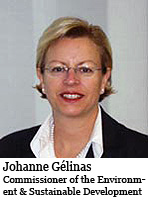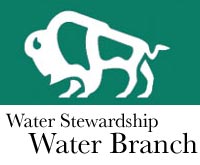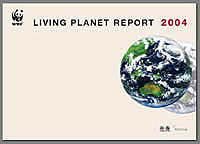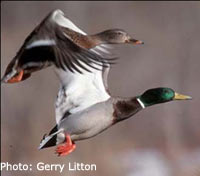
News |
- Protecting Environment Top Priority Of 2004
- World Heritage Site Support Demanded
- Canada to Lose Reputation as Environmental Leader?
- 40,000 Email Canada's Environment Minister
- New Lake Manitoba Stewardship Board
- Russia Ratifies Kyoto
- 'Living Planet Report 2004' - Ecological Debt
- Deh Cho Seeks Pipeline Injunction
- Aboriginal Title Claim to Great Lake Will Proceed
- Guide to Boreal Birds Released
- NRDC Mobilizing for Federal Wuskwatim Panel
- Wuskwatim Environmental Report Notes Deficiencies
Protecting Environment Top Priority Of 2004 |
05 November 04 |
 Protecting the environment (76%) comes first among three items that Canadians say should be a priority for the new federal government. The other two - spending more on health care (75%) and increased federal provincial cooperation (74%) - are just about in a dead heat with the environment.
Protecting the environment (76%) comes first among three items that Canadians say should be a priority for the new federal government. The other two - spending more on health care (75%) and increased federal provincial cooperation (74%) - are just about in a dead heat with the environment.This a significant finding from this year's 2004 edition of Portraits of Canada, the annual tracking poll carried out by the Centre for Research and Information on Canada (CRIC). "This the first time in over a decade of polling that I have seen the environment rank so high as a public concern," said Dr. Donna Dasko, Senior Vice-President for Environics Research Group Limited, and Governor of the Canadian Unity Council. These three priorities are at the top of the list across the entire country, regardless of region. Respondents were asked to rank priorities from a list of 11 choices. Last year, the environment was not included in the list of potential priorities. View the full November 2004 CRIC article (PDF) Visit the Portraits of Canada web site Source: CRIC
|
|
World Heritage Site Support Demanded |
04 November 04 |
 The public has a new opportunity to voice its support for the proposed World Heritage Site (WHS) that spans the eastern side of Manitoba into northwestern Ontario. As part of its BioGems campaign regarding the area known as the 'Heart of the Boreal', the Natural Resources Defense Council (NRDC) is asking its supporters to send a letter to cabinet Ministers in Manitoba and Ontario urging the governments to follow the lead of the federal government and support the proposed WHS.
The public has a new opportunity to voice its support for the proposed World Heritage Site (WHS) that spans the eastern side of Manitoba into northwestern Ontario. As part of its BioGems campaign regarding the area known as the 'Heart of the Boreal', the Natural Resources Defense Council (NRDC) is asking its supporters to send a letter to cabinet Ministers in Manitoba and Ontario urging the governments to follow the lead of the federal government and support the proposed WHS.The letter urges the governments to: work with the First Nations who have proposed the WHS in order to protect these globally important lands; and provide support for the First Nations' plans for conservation and management of these traditional lands. Two significant wilderness parks, one in each province, are part of the WHS nomination. "Ottawa has let Canadians know that their federal government is behind the First Nations' visions of international recognition for protecting and managing their traditional lands", said Manitoba Wildlands Director, Gaile Whelan Enns, "It is time for the Manitoba government to formally state its intention to support this internationally significant boreal forest World Heritage Site." The previous action letter on the NRDC site went to Canada's Environment Minister to request the establishment of a federal environmental review panel for the Wuskwatim hydro projects proposed in northern Manitoba. Over 47,000 letters have been forwarded to date. View the NRDC Nature's Voice article on the Boreal Forest Sources: NRDC, Manitoba Wildlands
|
|
Canada to Lose Reputation as Environmental Leader? |
04 November 04 |
 The Canadian government is not doing enough to protect the environment because of a lack of leadership and political will, according to Canada's Commissioner of the Environment and Sustainable Development. The report indicates that Canada's reputation as an environmental leader is slipping because most federal departments aren't paying attention to the impacts of their policies. A cabinet directive issued 14 years ago, requiring all departments to assess the environmental impact of their policies, is not being followed, according to the 4th annual report issued on October 26, 2004 by Commissioner Johanne Gelinas.
The Canadian government is not doing enough to protect the environment because of a lack of leadership and political will, according to Canada's Commissioner of the Environment and Sustainable Development. The report indicates that Canada's reputation as an environmental leader is slipping because most federal departments aren't paying attention to the impacts of their policies. A cabinet directive issued 14 years ago, requiring all departments to assess the environmental impact of their policies, is not being followed, according to the 4th annual report issued on October 26, 2004 by Commissioner Johanne Gelinas. In the section, Assessing the Environmental Impact of Policies Plans and Programs, the Commissioner bluntly stated that there is a low level of commitment in departments and agencies toward conducting strategic environmental assessments. The report was critical of federal departments for the failure to apply the directive, which has resulted in the current situation where there is little confidence that environmental aspects to policies and decisions are assessed systematically. Ministers and the Cabinet are not then receiving sufficient information to make informed decisions on proposed policies, programs, and plans. The report also states that salmon stocks are dwindling, oil is polluting the coasts and air quality is deteriorating. Environment Minister Stephane Dion said the government was ready to act on some of the report's recommendations. Canada's ranking on environmental objectives slipped to 16th place in 2003, from 12th in 2002, according to the Organization for Economic Co-operation and Development. View the CBC News Online article View the Reuters news story on Planet Ark View the 2004 report by Canada's Commissioner of the Environment and Sustainable Development View Chapter 4 of the Commissioner's report - Assessing the Environmental Impact of Policies Plans and Programs Sources: Government of Canada, CBC News Online, Reuters
|
|
40,000 Email Canada's Environment Minister |
02 November 04 |
 A coalition of Canadian and U.S. environmental organizations are calling on the Canadian Environment Minister to establish a full federal panel review of the Wuskwatim Hydro projects. Manitoba Wildlands, the Boreal Forest Network and the U.S.-based Natural Resources Defense Council have asked their members and networks to let Minister Dion know that a federal panel is necessary before potential licenses for the Wuskwatim projects. As of Wednesday October 27, over 40,000 North American activists have written to the Minister requesting the federal panel. By week's end 47,000 messages had been sent.
A coalition of Canadian and U.S. environmental organizations are calling on the Canadian Environment Minister to establish a full federal panel review of the Wuskwatim Hydro projects. Manitoba Wildlands, the Boreal Forest Network and the U.S.-based Natural Resources Defense Council have asked their members and networks to let Minister Dion know that a federal panel is necessary before potential licenses for the Wuskwatim projects. As of Wednesday October 27, over 40,000 North American activists have written to the Minister requesting the federal panel. By week's end 47,000 messages had been sent."NRDC activists are eager to help change behavior in the United States that threatens the boreal forest," said Susan Casey-Lefkowitz, director Canada projects, Natural Resources Defense Council. "The boreal forest should be our biggest conservation opportunity, not our biggest development opportunity." View the press release View the Clean Environment Commission Wuskwatim report Source: Manitoba Wildlands/Boreal Forest Network/Natural Resources Defense Council
|
|
New Lake Manitoba Stewardship Board |
02 November 04 |
 Manitoba will create the Lake Manitoba Water Stewardship Board to better meet the contemporary water management needs of this important resource, Water Stewardship Minister Steve Ashton announced October 27, 2004.
Manitoba will create the Lake Manitoba Water Stewardship Board to better meet the contemporary water management needs of this important resource, Water Stewardship Minister Steve Ashton announced October 27, 2004."The stewardship board will assist government in assessing the recommendations of the Lake Manitoba Regulation Review Advisory Committee and improving overall water quality," said Ashton. "The next steps include appointment of board members and the development of long-term action plans." The minister noted that the government has accepted in principle the recommendations of the committee. It is considered the best course of action for the water system along the Fairford River, Lake Pineimuta, Lake St. Martin and the Dauphin River. Lake Manitoba is the second largest lake in Manitoba at 4,630 square kilometers, 200 km long, and mainly fed from Lake Winnipegosis. View the Manitoba Government report Source: Manitoba Government
|
|
Russia Ratifies Kyoto |
02 November 04 |
 Russia's State Duma lower house of parliament has ratified the Kyoto Protocol by a vote of 334 to 74, clearing the way for the long-delayed climate change treaty to come into force worldwide. Although the endorsement by the Duma is critical, the bill still has to go through the upper house and be signed into law by President Vladimir Putin.
Russia's State Duma lower house of parliament has ratified the Kyoto Protocol by a vote of 334 to 74, clearing the way for the long-delayed climate change treaty to come into force worldwide. Although the endorsement by the Duma is critical, the bill still has to go through the upper house and be signed into law by President Vladimir Putin.The Russian ratification occurred on Friday, October 22, 2004 and is of particular significance because the Protocol enters into force only when ratified by at least 55 countries accounting for at least 55 percent of developed country emissions in 1990. Russia's formal ratification pushes the 126-nation U.N. pact, aimed at battling global warming through curbing greenhouse gas emissions, over the threshold, making the protocol internationally binding for those industrialized countries that have ratified it (including Canada). Also, the market-based mechanisms established under Kyoto, including international emissions trading and the Clean Development Mechanism, will become fully operational. The Protocol enters into force 90 days after the Russian government deposits its instrument of ratification with the United Nations, which is expected to happen within days. View the United Nations Framework Convention on Climate Change news story View the Reuters news story View the Pew Center on Global Climate Change statement on Russia's ratification of Kyoto View the Pew Center Q & A web page on Russia and the Kyoto Protocol View the Pew Center web page with a Glossary of terms related to Kyoto Sources: UNFCC, Pew Center on Global Climate Change, Reuters
|
|
'Living Planet Report 2004' - Ecological Debt |
27 October 04 |
 The human race is plundering the planet at a pace that outstrips its capacity to support life, according to a report by WWF. The Living Planet Report 2004 report is the fifth in the series that uses data provided by the Global Footprint Network to measure human demands on the planet's ecological assets.
The human race is plundering the planet at a pace that outstrips its capacity to support life, according to a report by WWF. The Living Planet Report 2004 report is the fifth in the series that uses data provided by the Global Footprint Network to measure human demands on the planet's ecological assets.The Living Planet Report 2004 shows that humans currently consume 20% more natural resources than the earth can produce. Particularly alarming is our energy footprint - dominated by our use of fossils fuels such as coal, gas and oil. This is the fastest growing component of the ecological footprint, increasing by nearly 700 per cent between 1961 and 2001. WWF points out that the over-exploitation of these fuels is putting the whole of humanity under threat from climate change. WWF is calling on business leaders, governments, and civil society to promote the existing technologies and tools, and to develop innovative solutions to meet the challenges of living within the capacity of one planet. Highlights include an examination of four possible paths to the future and options for reducing human dependence on the planet's resources. View the WWF news release Visit the WWF Living Planet Report 2004 web page Download the Living Planet Report 2004 report Visit the Global Footprint Network web page on Living Planet Report 2004 View the CBC News Online story about Living Planet Report 2004 Sources: WWF International, Global Footprint Network
|
|
Deh Cho Seeks Pipeline Injunction |
26 October 04 |
 The Deh Cho First Nations (DCFN) of the Northwest Territories filed two separate court actions in September 2004 contesting the legality of the joint panel review examining the environmental effects of the $5 billion Mackenzie Gas Project (MGP). The application, filed in federal court, requests a halt to the Joint Review Panel appointed to review the Mackenzie Valley Pipeline Project, until the First Nations agree to the panel. The DCFN are also seeking an injunction to stop any hearings until their court application has been heard.
The Deh Cho First Nations (DCFN) of the Northwest Territories filed two separate court actions in September 2004 contesting the legality of the joint panel review examining the environmental effects of the $5 billion Mackenzie Gas Project (MGP). The application, filed in federal court, requests a halt to the Joint Review Panel appointed to review the Mackenzie Valley Pipeline Project, until the First Nations agree to the panel. The DCFN are also seeking an injunction to stop any hearings until their court application has been heard.The DCFN had asked the federal government to be allowed to participate in the appointment of two people to the seven-member panel. That same allowance was given to the Inuvialuit people, further north along the pipeline route. Forty percent of the proposed pipeline would traverse DCFN territory. In an October 7, 2004 press release, the Deh Cho called on Imperial Oil and other prospective developers involved in the project to indicate their good faith by supporting their efforts to lobby the federal government regarding review panel composition. Environmental groups such as the Sierra Club of Canada support Deh Cho First Nations' right to participate as a partner in the joint panel review. View the September 16, 2004 Deh Cho First Nations press release (PDF) View the Deh Cho First Nations federal court application (PDF) View the October 7, 2004 Deh Cho First Nations press release (PDF) Visit the Deh Cho First Nations web site View the Sierra Club of Canada Campaign Mackenzie Valley Pipeline web page Source: Deh Cho First Nations
|
|
Aboriginal Title Claim to Great Lake Will Proceed |
22 October 04 |
 The governments of Canada and Ontario have failed in their second attempt to invalidate a claim of Aboriginal title to parts of Lake Huron and Georgian Bay. The two levels of government were arguing that the claim of the Chippewas of Nawash Unceded First Nation and the Saugeen First Nation was not compatible with the common law rights of public navigation or with Crown sovereignty over the bodies of water.
The governments of Canada and Ontario have failed in their second attempt to invalidate a claim of Aboriginal title to parts of Lake Huron and Georgian Bay. The two levels of government were arguing that the claim of the Chippewas of Nawash Unceded First Nation and the Saugeen First Nation was not compatible with the common law rights of public navigation or with Crown sovereignty over the bodies of water.The court rejected the governments' arguments, stating that the Bands should have a right to develop their position at trial. This is the first time that a Canadian court has examined the issue of Aboriginal title on navigable waters. View the Chippewas of Nawash Unceded First Nation and Chippewas of Saugeen First Nation September 18, 2004 press release For more information and background on the First Nations' claim, visit the Saugeen Ojibway web site Source: Chippewas of Nawash Unceded First Nation and Chippewas of Saugeen First Nation
|
|
Guide to Boreal Birds Released |
22 October 04 |
 The first-ever interactive guide to Boreal birds will be a new tool for the millions of US bird enthusiasts who track birds at their backyard birdfeeders and in their local communities. The Boreal Bird Guide was launched October 7, 2004 by the Boreal Songbird Initiative (BSI), in partnership with the Ducks Unlimited and the National Wildlife Federation.
The first-ever interactive guide to Boreal birds will be a new tool for the millions of US bird enthusiasts who track birds at their backyard birdfeeders and in their local communities. The Boreal Bird Guide was launched October 7, 2004 by the Boreal Songbird Initiative (BSI), in partnership with the Ducks Unlimited and the National Wildlife Federation.The new guide features an interactive map where visitors will be able to click on one of 25 U.S. cities to see a list of Boreal-breeding birds that migrate through or winter in that area. For some cities, the guide includes detailed local narratives about sighting boreal birds. The new bird guide also includes recorded calls, flyway maps and breeding, feeding and habitat information for commonly sighted Boreal birds. One-third of all North American birds breed in Canada's Boreal forest regions. During the summer breeding season, the Boreal is home to nearly 300 species of birds. Up to five billion birds migrate from Canada's Boreal forest to wintering grounds in the U.S. and farther south. Almost half of North America's ducks and geese use the Boreal for some portion of their lifecycle. View the Boreal Songbird Initiative October 7, 2004 press release Visit the interactive Boreal Bird Guide Visit the Boreal Songbird Initiative web site Source: Boreal Songbird Initiative
|
|
NRDC Mobilizing for Federal Wuskwatim Panel |
19 October 04 |
 Canada's Minister of the Environment will soon be receiving a barrage of letters urging him to appoint a federal panel to review the social, economic and environmental impacts of both existing and proposed hydro projects in Manitoba. As part of its campaign to protect Boreal Forests in Manitoba, the US-based Natural Resources Defense Council (NRDC) is asking its BioGem supporters to send these letters to demonstrate the public's concerns about damage from hydropower dams on the boreal's wildlife, forest ecosystems, and communities. The letters also ask the Manitoba government and Manitoba Hydro to honor their commitment to mitigate damage caused by existing dams - and halt new hydro developments until an independent panel reviews the cumulative impacts of dam and transmission line construction and operation.
Canada's Minister of the Environment will soon be receiving a barrage of letters urging him to appoint a federal panel to review the social, economic and environmental impacts of both existing and proposed hydro projects in Manitoba. As part of its campaign to protect Boreal Forests in Manitoba, the US-based Natural Resources Defense Council (NRDC) is asking its BioGem supporters to send these letters to demonstrate the public's concerns about damage from hydropower dams on the boreal's wildlife, forest ecosystems, and communities. The letters also ask the Manitoba government and Manitoba Hydro to honor their commitment to mitigate damage caused by existing dams - and halt new hydro developments until an independent panel reviews the cumulative impacts of dam and transmission line construction and operation.The Manitoba government recently received a report from its Clean Environment Commission (CEC) that recommends approval of environmental licenses for the Wuskwatim dam and associated transmission project. Canadians can send letters through the NRDC site; letters can be adjusted to reflect Canadian concerns. Visit NRDC's Heart of the Boreal BioGem web page Send a letter to the federal Environment Minister on the NRDC web site View Manitoba Wildlands' news item about the CEC Wuskwatim projects report. View past Manitoba Wildlands news items on the Heart of the Boreal BioGem, Additional news item Source: NRDC
|
|
Wuskwatim Environmental Report Notes Deficiencies |
19 October 04 |
 Manitoba's Clean Environment Commission (CEC) released it report "Report on Public Hearings - Wuskwatim Generation and Transmission Projects" October 4, 2004. The CEC Wuskwatim report recommends Manitoba grant licenses to both Wuskwatim projects. However, the CEC report also identifies deficiencies in the Wuskwatim filings, and offers a series of recommendations that have important implications for the Wuskwatim projects and future Manitoba Hydro projects.
Manitoba's Clean Environment Commission (CEC) released it report "Report on Public Hearings - Wuskwatim Generation and Transmission Projects" October 4, 2004. The CEC Wuskwatim report recommends Manitoba grant licenses to both Wuskwatim projects. However, the CEC report also identifies deficiencies in the Wuskwatim filings, and offers a series of recommendations that have important implications for the Wuskwatim projects and future Manitoba Hydro projects.In its report, the CEC takes note of the significant 'legacy' issues that remain unaddressed due to effects and impacts from existing hydro development and acknowledges that the major hydroelectric projects from the 1970s are only licensed on an interim basis. The CEC recommends that all outstanding community and environmental issues with regard to these existing projects be addressed and then Manitoba Hydro should apply for permanent environmental licenses for these dams and transmission projects. "The CEC has confirmed the importance of many of the questions asked, and recommendations made by public participants during the Wuskwatim review and hearings." noted Manitoba Wildlands Director Gaile Whelan Enns, "We will be monitoring Manitoba Hydro and the Government of Manitoba closely. Actions that reflect the CEC's recommendations to fundamentally change environmental assessment in Manitoba must be taken immediately." The federal comprehensive assessment of the Wuskwatim Generation project will be released in the coming months. The report will be subject to a public review and comments period. View a list of CEC recommendations View the CEC Wuskwatim report (Recommendations start on Page 122) Sources: Clean Environment Commission, Manitoba Wildlands
|
|


 RSS Feeds:
RSS Feeds: